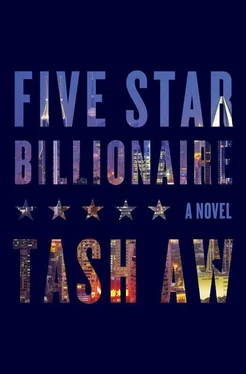“Lucky thing it was raining,” Justin heard a shopkeeper say to a passerby. “Otherwise I think all these shops around here also kena burn to the ground.”
“Ya-lah, nasib.”
Justin began to slow as they headed toward the fire engines, allowing Sixth Uncle to walk ahead. He paused by a group of shopkeepers who were standing at the entrance to a Chinese medicine shop, the shutters pulled halfway down. “Morning already it started, what time I don’t know — ten, eleven? After lunch only the firemen can put it out. Over thirty firemen, you know. You see? Now also still got smoke and all that. Wah , it was really big, man. Old buildings like that, not surprising, what. The electric wires all rosak already, isn’t it?”
Obscured by the fire engines, there was a perfect square of charred timber jutting at odd angles, rising half a story into the air — it looked like one of those ghostly pictures of redwood forests after a fire, silent and still. It took Justin a few moments to recognize this as the site of the New Cathay cinema; above the quieting hush of the rain and the low, respectful rumble of the traffic, he thought he could hear the sizzle and fizz of the ashes.
“What?” Sixth Uncle said. “What are you giving me that look for? You just spend all your time relaxing with your friends, lepak- ing down by the beach, and I have to end up sorting out your shit.”
“I said I was going to figure things out.”
“Figure things out, figure things out. How damn long was it going to take you? You’re still such a mommy’s boy. You need to grow up, stop being a sissy.” He put his arm around Justin’s shoulder. “Sometimes we have to do stuff we don’t like. I’ve tidied things up for you this time, but next time you’ll have to do it yourself. Come on, the table will be ready now. I’m hungry. What are you going to have, chicken chop as usual?”
They walked slowly back toward the restaurant. Sixth Uncle took out his pack of cigarettes but found it was empty; he scrunched it up and threw it into the drain. “Dammit, I’m getting too old for this,” he said, and went into the restaurant.
Justin stood outside for a moment, looking up to try to find the spire of smoke again. The rain was clearing and the twilight was tinged an ash-brown, otherworldly in appearance; the traffic was still solid, people were still walking about wearing plastic ponchos, there were still scooters weaving their way between the stationary cars. Time, Justin thought again: how it expands to fill the spaces that life creates, how it stretches brief moments and makes them last forever.
27. NOTHING IN LIFE LASTS FOREVER

ON THEIR RETURN FROM BEIJING, BOTH YINGHUI AND WALTER were swept up by other business and could not concentrate on figuring out the terms of their joint venture, as they promised each other they would. Yinghui tried to think of their collaboration solely as a business enterprise, but it was not easy now; things had changed.
In Beijing, she had made a fool of herself. Sitting with Walter on a bench on the edge of a canal with the walls of the Forbidden City as a backdrop, she had become tired and teary, alarmed at how rapidly she had lost her composure. She thought that she had mastered her emotions, had dealt with everything that happened with her father a long time ago. Her frantic work routine, her multiple award-winning businesses, her yoga — all these things had helped her pack away the messiness of the past in neat little trunks, but suddenly they had been strewn across the space of her memory, swirling around as if carried by swift-flowing floodwater. She had leaned over and placed her head on Walter’s chest, expecting him — needing him — to wrap his arms protectively around her; when he did not, she clutched at his shirt with one hand, sobbing silently. His body felt hot and damp and unmoving. And after a while — she wasn’t sure how long exactly — when it was clear that he was not going to embrace her, she pulled away from him, still breathing in short heavy breaths, her nose runny and slightly sniffly. He was looking at her with a faint smile on his face: He found this funny, she thought.
It took her a few moments to gather herself; her cheeks and eyes felt puffy, and her carefully styled hair stuck to her face in wisps. She remembered the breathing techniques she had learned in her various forms of exercise, from tai chi to vinyasa to half-marathon running, and after a few minutes was able to calm down again. But what she could not shake was the acute embarrassment, the feeling of having exposed herself as someone lacking in grace and strength — and, above all, as someone needy. Need equaled shame, she had always thought; to need someone was shameful, the opposite of respect. Even the word itself sounded weak, wheedling: “need.” The thin, elongated vowel signaled an emptiness of the imagination — the cry of a damsel in distress or a hapless child who needed protecting. He had been so keen to dig out stories from her past, as if he had wanted to humiliate her by making her remember all the things that made her weak, as if he was trying to put all her fragility on display for the entire world to witness. She struggled to understand why he was doing that, until she realized that it was not his fault but hers: She was the one who couldn’t deal with the past; it was nothing to do with him.
Love, of course, was out of the question — why had she ever thought that might be possible?
By the time they got back to the hotel, after a taxi ride that seemed extraordinarily complicated — the driver had lost his way — she was sufficiently in command of her emotions to be able to make a joke or two. Lucky they made it back, she said; she was worried that the cabdriver was going to abduct them and take them to Tianjin to sell their kidneys to underworld gangs. Walter laughed politely, and they took the lift back up to their rooms in silence, staring at the ascending numbers, feeling that the count from one to five had never before seemed so long. He got out and stood looking at her as the glass doors closed. As the lift carried her up and away, she wondered if that would be the last time she saw him.
Back in Shanghai, she was glad for his text saying that he would be very busy in the coming days leading up to his charity concert for the Sichuan earthquake orphans and that he would not be able to see her much. It suited her that he was otherwise occupied, for it gave her time to reassert her boundaries and restore her independence. Whereas just a short time ago she had found her businesses limiting and suffocating in their narrow scope, she now found them reassuring in their cheerful familiarity. When she saw the new ads her team had produced for the FILGirl clothes range, she smiled at the images of small children playing in sunlit fields. The posters shone with garish primary colors: The sun wore a smiley face, the pastures were plastic-y green, and the robin that perched on one of the children’s fingers looked stiff and flightless. It was rudimentary, almost tacky in its effect, but its simplicity made Yinghui feel happy. The girl in the middle of the picture wore a colorful pinafore printed with red flowers; she smiled openmouthed with wonder and delight, reaching out to touch the unmoving bird. Yinghui spent all afternoon discussing which posters should be used for their next online campaign. The entire team sat for three hours drinking tea and eating egg tarts that Yinghui had bought.
Elsewhere, even the niggling problems that had been plaguing the Thai spa seemed no longer to be a source of worry but a chance for Yinghui to apply herself to what she did best — the resolution of tricky situations. It turned out that the former manager had left for good, as girls often did nowadays, without any satisfactory explanation. Yinghui was obligated to spend several days in the spa, personally reorganizing the schedule and calling each employee into the office for an interview, during which she reminded them of the terms of their employment. She even had to fire one girl, who admitted to stealing nail varnish and body cream from company stocks. She spent a few long hours in the stockroom, counting each carton of shampoo as if she were a small-town shopkeeper, and on a few evenings she made sure she stayed until after closing time to verify the smooth conclusion of the spa’s working day up to the very last minute.
Читать дальше
Конец ознакомительного отрывка
Купить книгу



![Scott O’Hara - Five-Star Fugitive [= Border Town Girl]](/books/432138/scott-o-hara-five-thumb.webp)









